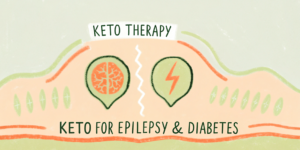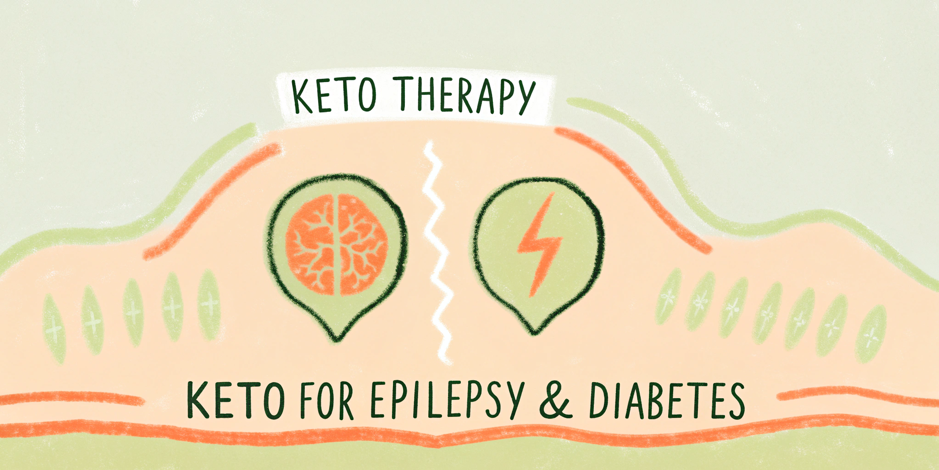The ketogenic diet (keto) has gained significant attention for its therapeutic benefits in managing epilepsy and diabetes. Originally developed in the 1920s as a treatment for epilepsy, keto has since been studied for its impact on blood sugar control, insulin resistance, and neurological disorders.
This guide explores how the keto diet can help manage epilepsy and diabetes, backed by scientific research and expert recommendations.

How the Keto Diet Helps in Managing Epilepsy
What is Epilepsy?
Epilepsy is a neurological disorder characterized by recurrent seizures, which occur due to abnormal electrical activity in the brain. While medications are commonly used to control seizures, some individuals experience drug-resistant epilepsy, requiring alternative treatments.
How Keto Reduces Seizures
The ketogenic diet is a high-fat, low-carb diet that induces a metabolic state called ketosis. During ketosis, the body produces ketone bodies as an alternative energy source to glucose. These ketones have neuroprotective properties, stabilizing brain activity and reducing seizure frequency.

Research on Keto and Epilepsy
- Seizure Reduction: Studies show that 50% of epilepsy patients experience a significant decrease in seizures, with 10-15% achieving complete seizure freedom (MDPI).
- Effective for Drug-Resistant Epilepsy: Research indicates that keto is beneficial not only for children but also for adults with drug-resistant epilepsy (PMC).
- Neuroprotective Effects: The production of ketones may enhance brain function and reduce neuronal inflammation.
- Long-Term Benefits: Some evidence suggests that long-term adherence to keto can lead to sustained seizure control, reducing the reliance on medication.
How to Implement Keto for Epilepsy
- Medical Supervision: Always consult a doctor before starting keto, especially for epilepsy management.
- High Fat Intake: Increase consumption of healthy fats such as avocados, nuts, olive oil, and fatty fish.
- Monitor Ketone Levels: Staying in ketosis is crucial for effectiveness.
- Avoid Processed Carbs: Reduce sugar, grains, and high-carb foods.
- Gradual Transition: Starting with a low-carb diet before fully switching to keto may help ease the transition.
How Keto Helps in Managing Diabetes
What is Diabetes?
Diabetes is a chronic metabolic disorder affecting blood sugar levels. There are two primary types:
- Type 1 Diabetes: An autoimmune condition where the body does not produce insulin.
- Type 2 Diabetes: A condition characterized by insulin resistance and high blood sugar levels.
Keto and Blood Sugar Control
Since the keto diet drastically reduces carbohydrate intake, it prevents blood sugar spikes, making it an effective dietary approach for type 2 diabetes management.

Research on Keto and Diabetes
- Lower HbA1c Levels: Studies show significant reductions in HbA1c (a key marker for blood sugar control) in diabetic patients following a keto diet (PMC).
- Medication Reduction: Some patients can reduce or eliminate diabetes medication when adhering to a well-planned keto diet (Michigan Medicine).
- Improved Insulin Sensitivity: Keto can help lower insulin resistance, making the body more efficient at processing glucose.
- Weight Management: Since obesity is a major risk factor for type 2 diabetes, keto’s role in fat loss makes it a sustainable option for diabetes management.
Can Keto Help with Type 1 Diabetes?
While keto shows promise for type 2 diabetes, it requires caution for type 1 diabetes due to the risk of diabetic ketoacidosis (DKA). Patients should consult a healthcare provider before starting keto (Cleveland Clinic Journal).
How to Implement Keto for Diabetes
- Track Blood Sugar Levels: Regularly monitor glucose to prevent hypoglycemia.
- Choose Healthy Fats: Incorporate sources like avocados, nuts, and olive oil.
- Eat Non-Starchy Vegetables: Focus on low-carb vegetables like broccoli, spinach, and cauliflower.
- Avoid Processed Keto Foods: Stick to whole, unprocessed foods for the best health outcomes.
- Balance Protein Intake: Excess protein can convert into glucose, so moderate intake is important.
Potential Risks and Considerations
While keto offers numerous benefits, it is essential to be aware of potential risks:

- Keto Flu: Some experience fatigue, headaches, and nausea when transitioning to keto. This can be managed by staying hydrated and maintaining electrolyte balance.
- Nutrient Deficiencies: Restricting carbs may lead to deficiencies in vitamin C, magnesium, and potassium. Include nutrient-rich foods to compensate.
- Digestive Issues: Lower fiber intake may cause constipation. Eating fiber-rich keto-friendly foods like chia seeds and flaxseeds can help.
- Heart Health Considerations: Some people may experience increased LDL cholesterol. Choosing healthy fats over processed meats is key.
- Sustainability: Following keto long-term requires discipline and meal planning to maintain balanced nutrition.
Final Thoughts: Is Keto Right for Epilepsy and Diabetes?
The ketogenic diet has strong scientific backing for managing both epilepsy and diabetes. While it offers seizure reduction for epilepsy patients and improved blood sugar control for diabetics, individualized medical supervision is crucial.
For those considering keto for health management:
- Consult a healthcare provider before starting keto, especially for epilepsy and diabetes.
- Monitor health markers regularly to track improvements and adjust the diet accordingly.
- Choose nutrient-dense foods to ensure a balanced and sustainable keto lifestyle.
- Adopt a gradual transition to keto rather than making sudden dietary changes.
With proper guidance and dietary planning, keto can be a powerful tool for long-term health benefits.
References
- MDPI – “Ketogenic Diet in the Treatment of Epilepsy” Read more
- PMC – “Effects of the Ketogenic Diet on Glycemic Control in Diabetic Patients” Read more
- Michigan Medicine – “Liquid Low-Calorie or Low-Carb Keto Diet Can Reverse Type 2 Diabetes” Read more
- Cleveland Clinic Journal – “Ketogenic Diets in the Management of Type 1 Diabetes” Read more
- PMC – “Ketogenic Diet and Epilepsy” Read more

 Animal-Based Foods
Animal-Based Foods 


 Fruits & Vegetables
Fruits & Vegetables 


 Nuts, Seeds & Grains
Nuts, Seeds & Grains 


 Beverages
Beverages 

 Oils, Sauces & Condiments
Oils, Sauces & Condiments 



 Packaged & Processed Foods
Packaged & Processed Foods 




